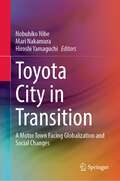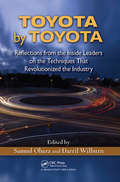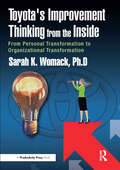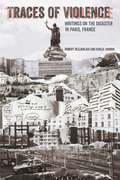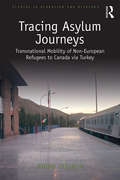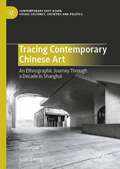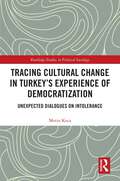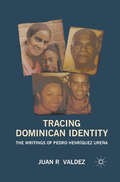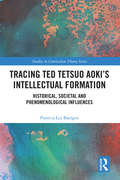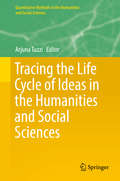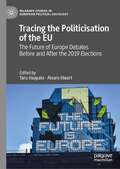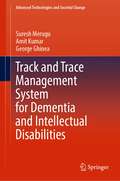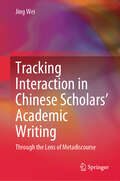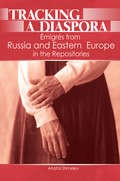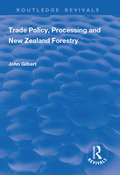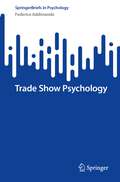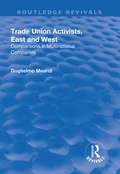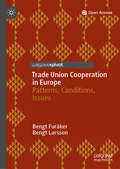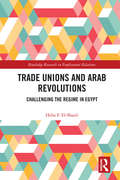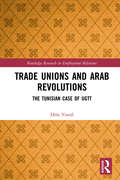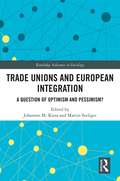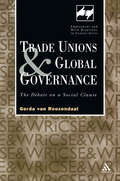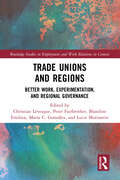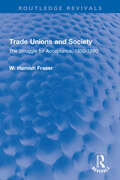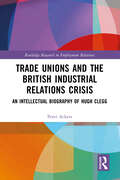- Table View
- List View
Toyota City in Transition: A Motor Town Facing Globalization and Social Changes
by Hiroshi Yamaguchi Nobuhiko Nibe Mari NakamuraThis informative monograph focuses on the city of Toyota, located in Aichi Prefecture, Japan. Aside from the fact that most Toyota passenger vehicles are produced there, generally little is known about its reality.Since the 1960s, the city has continuously attracted numerous jobseekers from distant rural areas. Owing to years of stable employment and settlement within local communities, once-new workers gradually build strong ties with their neighbours and actively participate in residential activities. This pattern of settlement provides a unique example of long-prosperous industrial cities, which deserves discussion against a backdrop of the present “de-industrializing” urban economies.Unfortunately, this favourable situation is now changing, despite the regional economy’s steady recovery from the 2008 financial crisis. Addressing this paradox is the main focus of the present book. The upgrading of the Toyota Production System and concomitant widening class disparity are damaging local ties under severe pressure from global competition. Other suppressing factors are driven by sociological conditions, such as aging, declining marriage rates and birth rates. By comparing two sets of survey data, from 2009 and 2015, and performing fieldwork research in two communities that once were “new towns”, the book seeks to provide an understanding of the present situation of this unusual industrial city. At the same time, a unique theoretical perspective is revealed that does not fit the mould of either the Chicago School or the new urban sociology.
Toyota by Toyota: Reflections from the Inside Leaders on the Techniques That Revolutionized the Industry
by Samuel Obara Darril WilburnWritten by former Toyota associates, Toyota By Toyota: Reflections from the Inside Leaders on the Techniques That Revolutionized the Industry focuses on the purpose of Lean methodologies, techniques, and principles. It compiles more than a century of combined experience from management-level employees who supply little-known insights about the Toyo
Toyota's Improvement Thinking from the Inside: From Personal Transformation to Organizational Transformation
by Sarah K. WomackThis book helps close the gap in how organizations think about and implement Toyota’s continuous improvement methods and management system. The Toyota Production System (TPS) is often viewed and adopted in organizations as a collection of tools to remove waste and streamline processes to provide products or services faster, better, or cheaper. While the tools for improvement and management routines are important, they are not where the true power of the system lies. The author’s eight-year journey inside Toyota was full of experiences that developed the power for continuous improvement. These learnings are rarely if ever captured in books on lean or taught in business and engineering classrooms.This book describes, in part, how Toyota, through its coaches and leaders, develops its members’ capabilities through a series of continuous improvement (kaizen and problem-solving) activities. For many members of Toyota, this process results in a personal transformation that ultimately leads to organizational transformation.This book presents a model for organizational transformation that includes technical systems, organizational principles/values, and spirituality/mindset to achieve enduring high performance. This book shifts from the continuous improvement development way at Toyota to case studies illustrating the thinking and mindset to other organizations on their journey to transformation. It uses the TPS tools as an entry point for development and highlights the role that organizational values play in the pace of transformation. Several case studies are presented that include manufacturing (performance improvement of a production line), healthcare (improvement in neurosurgery patient flow), and education (improvement in standardized test scores).The key benefit of this book is that it provides insights into Toyota’s culture and improvement thinking to help other organizations reach enduring high performance. The book is written for a wide audience so that readers outside of manufacturing organizations can understand the broad applicability of the Toyota way. In addition, it is written succinctly to help readers and practitioners focus their transformation efforts.Sarah K. Womack is a distinguished researcher and consultant in the field of Industrial Engineering. Her Ph.D. in the department of Industrial & Operations Engineering from the University of Michigan, Ann Arbor focused on the intersection of lean manufacturing practices and ergonomics. She has published peer-reviewed articles, presented as guest speaker at conferences and universities, and facilitated copious workshops on lean manufacturing. She has established herself as a leading scholar and consultant of one of the world’s most coveted management systems, the Toyota Production System. She spent eight years on a journey in various leadership roles of "learning by doing" under some of the world’s greatest lean thinkers at Toyota. Applying Toyota’s management thinking, she consults across an array of industries with an innovative and practical approach to continuous improvement, organizational transformation, and operational excellence - coaching at every level from the C-suite to the shopfloor. She continues to learn and collect a patchwork of stories to teach and inspire others on their operational excellence journeys. In addition to her writing, consulting, and speaking engagements, Sarah is passionate about traveling the world and immersing herself in diverse cultures.
Traces of Violence: Writings on the Disaster in Paris, France
by Prof. Robert R. DesjarlaisIn this highly original work, Robert Desjarlais and Khalil Habrih present a dialogic account of the lingering effects of the terroristic attacks that occurred in Paris in November 2015. Situating the events within broader histories of state violence in metropolitan France and its colonial geographies, the authors interweave narrative accounts and photographs to explore a range of related phenomena: governmental and journalistic discourses on terrorism, the political work of archives, police and military apparatuses of control and anti-terror deterrence, the histories of wounds, and the haunting reverberations of violence in a plurality of lives and deaths. Traces of Violence is a moving work that aids our understanding of the afterlife of violence and offers an innovative example of collaborative writing across anthropology and sociology.
Tracing Asylum Journeys: Transnational Mobility of Non-European Refugees to Canada via Turkey (Studies in Migration and Diaspora)
by Ugur YildizThis book explores the asylum journey of non-European asylum applicants who seek asylum in Turkey before resettling in Canada with the aid of the Canadian government’s assisted resettlement programme. Based on ethnographic research among Syrian, Afghan, Eritrean, Ethiopian, Iraqi, Iranian, Somali, Sudanese and Congolese nationals it considers the interactions of asylum seekers with both UNHCR’s refugee status determination and Canada’s refugee resettlement programme. With attention to the practices of migrants, the author shows how the asylum journey contains both mobility and stasis and constitutes a micro-political image of the fluidity and relativity of attributed identities and labels on the part of state migration systems. A multi-sited ethnography that shows how the migration journey is linked to the production and reproduction of knowledge, as well as the diffusion of produced knowledge among past, present, and future asylum seekers who form trans-local social networks in the course of their route, in Turkey, and in Canada. Tracing Asylum Journeys will appeal to sociologists and political scientists with interests in migration and transnational studies, and refugee and asylum settlement.
Tracing Contemporary Chinese Art: An Ethnographic Journey Through a Decade in Shanghai (Contemporary East Asian Visual Cultures, Societies and Politics)
by Isaac LeungThis book explores the author's ten-year ethnographic journey in different locations in Shanghai. His immersion in China’s art world is grounded in a topology of places and new ways of writing and deploying history today. The ethnographic approaches to experiencing, analysing and representing space offer a critical tool to explore a different version of realism invisible in the nominal art and art history paradigms. As the market and institutional norms are still being defined, this book also documents and analyses how individuals have strived to negotiate boundaries in the art world and thus create unique selfhood. Instead of conventional methods of periodisation and stylistic analysis, this book presents a historiographic strategy emphasising the philosophical significance of spatial realism to offer insights into history, subjectivities and political institutions.
Tracing Cultural Change in Turkey's Experience of Democratization: Unexpected Dialogues on Intolerance (Routledge Studies in Political Sociology)
by Metin KocaDoes democracy require an agreement on specific foundational values? Bringing insights from Turkey to the study of democratization, this book argues that democracy may rather be about acknowledging the disagreement over values before negotiating over other concerns, such as rights, freedoms, capabilities and duties. It explores this idea by examining three landscapes of culture in Turkey, which have been the subjects of persistent stories regarding the unequal relationship between the self and the other. These include LGBT visibility and the entertainment sector, women and clothing, and Alevism and funerals. Through these case studies, the book analyses the remaking of (in)tolerance through the integration of LGBT representations into broader political struggles over values, the assertion of women’s rights and freedoms from traditional values surrounding dress, and the conflict between essentialist intolerance and the syncretic traditions of Alevi identity. Bringing these landscapes together with the surrounding cultural tensions in Turkey and the West, Tracing Cultural Change in Turkey's Experience of Democratization will be a valuable resource for students and scholars of Middle Eastern studies and politics, gender studies and cultural studies.
Tracing Dominican Identity
by Juan R. ValdezThe author analyzes and discusses the socio-historical meanings and implications of Pedro Henríquez Ureña's (1884-1946) writings on language. This important twentieth century Latin American intellectual is an unavoidable reference in Hispanic Linguistics and Cultural Studies.
Tracing Ted Tetsuo Aoki’s Intellectual Formation: Historical, Societal, and Phenomenological Influences (Studies in Curriculum Theory Series)
by Patricia Liu BaergenThrough careful examination of Ted Aoki’s life and work within its historical, societal and intellectual context, this text advances a new appreciation of the national distinctiveness of Canadian curriculum studies. The book draws unique comparison between Aoki’s writings and Heidegger’s concept of "being-in-the-world." In exploring Aoki’s narratives on momentous life events, the author attends to the interwoven, dynamic and poetic essence of the scholar’s intellectual formation and identifies a critically reflective style of theorizing. By contextualizing Aoki’s narrations on his momentous life events, the text engages with Aoki’s critical reflective and unique style of theorizing and foregrounds the prominent influence of Heidegger’s phenomenology and writings on Aoki’s thinking. A major contribution to understanding Aoki’s curriculum scholarship, this book is an important resource for researchers and post-graduate students working across curriculum studies discourse.
Tracing the Life Cycle of Ideas in the Humanities and Social Sciences: A Portrait Of A Discipline Through Analyses Of Scientific Literature (Quantitative Methods in the Humanities and Social Sciences)
by Arjuna TuzziThis book demonstrates how quantitative methods for text analysis can successfully combine with qualitative methods in the study of different disciplines of the Humanities and Social Sciences (HSS). The book focuses on learning about the evolution of ideas of HSS disciplines through a distant reading of the contents conveyed by scientific literature, in order to retrieve the most relevant topics being debated over time. Quantitative methods, statistical techniques and software packages are used to identify and study the main subject matters of a discipline from raw textual data, both in the past and today. The book also deals with the concept of quality of life of words and aims to foster a discussion about the life cycle of scientific ideas. Textual data retrieved from large corpora pose interesting challenges for any data analysis method and today represent a growing area of research in many fields. New problems emerge from the growing availability of large databases and new methods are needed to retrieve significant information from those large information sources. This book can be used to explain how quantitative methods can be part of the research instrumentation and the "toolbox" of scholars of Humanities and Social Sciences. The book contains numerous examples and a description of the main methods in use, with references to literature and available software. Most of the chapters of the book have been written in a non-technical language for HSS researchers without mathematical, computer or statistical backgrounds.
Tracing the Politicisation of the EU: The Future of Europe Debates Before and After the 2019 Elections (Palgrave Studies in European Political Sociology)
by Taru Haapala Álvaro OleartDeparting from the idea that political controversies are embedded in the very framework of European integration, this volume focuses on the relationship between politicisation and European democracy. The contributors to this edited volume trace the various ways of understanding ‘politicisation’ before and beyond the 2019 European elections. The aim is to offer constructive reinterpretations of the concept for further research in the field. Encompassing different approaches, the book shows a plurality of perspectives and provides innovative analytical tools to make sense of the phenomenon of politicisation in the EU context. Assuming that EU politicisation can be seen both as vice and virtue depending on the way in which it takes place, the authors analyse under what conditions it has a positive or negative influence over European democracy. Emphasising that scholars ought to be aware of the normative assumptions underlying the conceptualisation of politicisation, the book illustrates how many of the features in European politics that were intensified during the Covid-19 pandemic were already present earlier. Tracing the Politicisation of the EU will be of interest to students and scholars in EU Studies, Comparative Politics, Media and Communication, Political Theory and Political Sociology.
Track and Trace Management System for Dementia and Intellectual Disabilities (Advanced Technologies and Societal Change)
by Amit Kumar George Ghinea Suresh MeruguThis book reviews humanitarian literature and presents the development of low-cost track & trace management system integrated with accurate GPS location data pinging using Internet of Things (IoT). The first part relates to mobile device configuration with an embedded GPS and wireless Internet connection to transmit its current location. The second part presents web server implementation and development that receives the data, parses it, and stores it for access over the Internet. The third part discusses the user interface that allows one to visually identify the current location of the device.
Tracking Interaction in Chinese Scholars’ Academic Writing: Through the Lens of Metadiscourse
by Jing WeiThis book tracks changes in the use of metadiscourse in Chinese scholars’ English and Chinese research articles, discusses how these changes reflect changes in Chinese scholars’ interactions with their peers in China and outside China, and analyzes how Chinese scholars are responding to changes in the academic context that embrace and shape rhetorical practices in the academic world. Around the turn of the twenty-first century, the Chinese government declared the goal of “enhancing international soft power,” and one important way to achieve this goal is to promote China’s global academic influence. China has indeed made remarkable strides in terms of academic output by publishing Chinese scholars’ research papers and monographs around the world. However, “international soft power” means more than just the export of papers or books; it means connecting to and participating in the academic world. For this to happen, Chinese scholars must get to know their international counterparts, understand their rhetorical preferences, and be willing (and able) to accommodate their needs.
Tracking a Diaspora: Émigrés from Russia and Eastern Europe in the Repositories
by Anatol ShmelevDiscover collections unused by other scholars!Russian immigrants are one of the least studied of all the Slavic peoples because of meager collections development. Tracking a Diaspora: Émigrés from Russia and Eastern Europe in the Repositories offers librarians and archivists an abundance of fresh information describing previously unrealized and little-used archival collections on Russian émigrés. Some of these resources have been only recently acquired or opened to the public, providing rich new avenues of research for scholars and historians. This unique source provides access to greater breadth and depth of knowledge of Russian and Eastern European immigrants, their backgrounds, and their experiences coming to the United States.Tracking a Diaspora is not only a helpful new resource to specialists but also serves as an introduction to archival research for amateur genealogists and scholars. Chapters comprehensively describe a single repository, thorough descriptions of a single collection, or offer thematic overviews, such as the theme of German emigration from Russia. The text includes detailed notes, references, figures and tables, and photographs.Tracking a Diaspora describes largely unknown collections, including: a major group of archival collections that reveals more on these immigrants and their assimilation problems the holdings of the museum, libraries, and archives of Holy Trinity Orthodox Seminary in upstate New York the archives of the Synod of the Russian Orthodox Church Outside Russia the archives and Lembich library at The Tolstoy Foundation, Inc., New York the Archives of the Orthodox Church in America the manuscript collections at the Historical Society of Pennsylvania (HSP) materials on the immigrants who settled in the Midwest six archival collections acquired by the State Archive of the Russian Federation the André Savine collection at the University of North Carolina, Chapel Hill, North Carolina and more!Tracking a Diaspora is of great interest to librarians, archivists, specialists in Russian history, and specialists in ethnic and immigration history.
Trade Policy, Processing and New Zealand Forestry (Routledge Revivals Ser.)
by John GilbertThis title was first published in 2000: Examines core issues with respect to the effect of export restrictions, the impact on processing and welfare, the consequences of foreign ownership of the resource, and the possibility of utilizing export restrictions as a retaliatory strategy against escalating tariff structures. It also examines the impact of liberalization of processed good markets. The book employs a combination of formal general equilibrium modelling and counterfactual simulation using computable general equilibrium (CGE) tecniques, with the New Zealand forestry industry used as a case study throughout. The book makes a contribution to the literature in this field by incorporating foreign ownership into an extensive formal analysis of processing incentives, develooping a new CGE model of the New Zealand economy, utilizing this model to evaluate the costs of export restrictions, and utilizing the GTAP to provide insights into the possible effect of the APEC Early Voluntary Sector Liberalization strategy.
Trade Show Psychology (SpringerBriefs in Psychology)
by Federico AddimandoIn this book, readers are taken on an illuminating journey into the world of trade shows from a unique perspective – the psychology of both exhibitors and attendees. This comprehensive guide delves deep into the intricacies of drawing visitors to your booth and forging meaningful connections. It offers a wealth of insights into the art of engaging potential clients effectively and understanding their behavior within the bustling trade show environment. The book covers a wide array of topics, including techniques for attracting visitors to your booth, effective communication strategies, and the psychology behind booth design. From the selection of color schemes and themes that resonate with your target audience to crafting compelling messages that leave a lasting impression, this book provides practical advice for achieving trade show success. It also explores the role of technology and digital marketing in modern trade show strategies, offering a blend of timeless principles and cutting-edge approaches. Moreover, the text delves into case studies and real-world examples from successful exhibitors, showcasing their innovative methods and success stories. Whether you're a seasoned trade show veteran or a newcomer looking to make a splash, this book equips you with the knowledge and strategies needed to thrive in the competitive world of trade shows. With its engaging and informative content, 'Trade Show Psychology' is an indispensable resource for anyone seeking to maximize their impact and ROI at trade shows.
Trade Union Activists, East and West: Comparisons in Multinational Companies (Routledge Revivals)
by Guglielmo MeardiThis title was first published in 2000: This text concerns the transformation of class consciousness. It shows that differences between trade union activists from the East and West are not inherited from the past but are socially constructed, and that Eastern trade unions are "no longer" like their Western counterparts, as opposed to "not yet" like them. The study concentrates mainly on Italy and Poland, with East and West referring to concepts and perceptions rather than as a geographical concern. It discovers whether the differences in trade union consciousness are due to the meaning members give a situation or the specificity of the local work settings.
Trade Union Cooperation in Europe: Patterns, Conditions, Issues
by Bengt Larsson Bengt FuråkerThis open access book discusses transnational trade union cooperation in Europe – its forms, focuses, conditions, and obstacles. It provides an overview of existing trade union cooperation and includes detailed analyses of two specific questions: the debates on statutory minimum wages and the Posting of Workers Directive. Drawing on empirical research, the authors take a comparative approach, considering national industrial relations regimes as well as individual sectors. With the ongoing processes of integration in Europe, it has become increasingly important for unions to cooperate with regard to employers and EU institutions. The authors illustrate the interconnections between national and European industrial relations, and explore the process of European integration in labour markets. Illustrating the potential for and difficulties involved in deepening trade union cooperation across Europe, this work is a vital read for trade unionists, researchers and students interested in European trade unionism and labour markets.
Trade Unions and Arab Revolutions: Challenging the Regime in Egypt (Routledge Research in Employment Relations)
by Heba F. El-Shazli“We started the 2011 revolution and the rest of Egypt followed,” say Egyptian workers with strong conviction and passion. Egyptian independent workers’ continuous claims of contention and protest repertoires were one of several main factors leading to the January 25, 2011, uprising. After thirty-two years of a Mubarak-led authoritarian regime, massive protests began in January 2011 and forced President Mubarak to step down from his position on February 11, 2011. So, how did Egyptian workers challenge the regime and how did they become one of the factors leading to the January 2011 uprising? These workers were organized into loose networks of different independent groups that had been protesting for a decade and longer prior to January 2011. These regular protests for over a decade before 2011 challenged the Egyptian authoritarian regime. This book examines the combative role of Egyptian independent workers’ formal and informal organizations as a contentious social movement to challenge the regime. It will examine the evolving role of workers as socio-economic actors and then as political actors in very political transitions. Social movement theory (SMT) and its mechanisms and social movement unionism (SMU) will be the lenses through which this research will be presented. The methodology used will be the comparative case studies of two different movements where workers who advocated for their rights for a decade prior to January 2011 experienced significantly differing outcomes. One case study showcases the municipal real estate tax collection workers who were able to establish a successful social movement and then create an independent trade union. The second case study examines an influential group of garment and textile workers, who also developed an effective social movement, yet they were not able to take it to the next step to establish an independent union. I will explore within this research a second question: why one group of workers was able to establish an independent union while the other arguably more influential group of workers, the garment and textile workers, was not able to do so. This had an impact on the overall influence they were able to exercise over the regime in addition to their effectiveness as a social movement for change.
Trade Unions and Arab Revolutions: The Tunisian Case of UGTT (Routledge Research in Employment Relations)
by Hèla YousfiThis book traces the role of the UGTT (the Tunisian General Labour Union) during Tunisia’s 2011 revolution and the transition period that ensued – Tunisia being the Arab country where trade unionism was the strongest and most influential in shaping the outcomes of the uprising. The UGTT; From its role as the cornerstone of the nationalist movement in the colonial era, has always had a key place in Tunisian politics: not so much a labour union but as an organisation that has always linked social struggles to political and national demands. Examining the role played by the UGTT in Tunisia's revolution and more generally in the restructuring of the Tunisian political arena during the three years following the popular uprising. This book asks searching questions such as; how did UGTT interact with the popular uprising that led to the departure of Ben Ali? What was the role played by the UGTT in the "political transition" leading to the adoption on January 26, 2014 of the first democratic constitution in the country’s history? How successful was the UGTT in neutralizing the risk of self- implosion caused by the different political and social crises? And what are the challenges that the UGTT faces in the new political landscape? This volume will be of key reading interest to scholars and researchers of social movements, labour movements, organizational studies, political transitions and Arab revolutions and also likely to be of interest to practitioners especially among activists, unionists and advocates within civil society.
Trade Unions and European Integration: A Question of Optimism and Pessimism? (Routledge Advances in Sociology)
by Martin Seeliger Johannes M KiessTrade Unions and European Integration brings together pessimists and optimists on trade unionism under the contemporary pressures of European integration. The Great Recession has brought new attention to structural problems of the European integration process, specifically monetary integration; holding the potential of disabling any trans-national co-ordination. Other authors argue that the current crisis also poses the chance for mobilization and new impulses for European trade unionism. This is discussed in the volume alongside a variety of topics including bargaining coordination, co-determination, European governance regimes, and European wide mobilization. While the importance of the question of how trade unionism and wage policy can, will, and should develop under the conditions of European integration seems widely shared, the polarization of the debate itself deserves our attention to learn about the opposing arguments and points of view; and to enhance academic discussion as well as consultancy to policy makers. This volume addresses this debate by bringing together the most distinguished voices and searching for common ground as well as new perspectives on European trade unionism and collective bargaining. The chapters of the volume, organised topically, are each accompanied by a comment from a distinguished scholar, highlighting the divisions of the debate. With this innovative approach, this book advances the dialogue between what have become openly opposed camps of optimists and pessimists on the future of European integration, trade unionism and its future chances. Trade Unions and European Integration will appeal to students and researchers interested in fields such as European Studies, Industrial Relations, Political Economics, Social Movements and Sociology of Work.
Trade Unions and Global Governance: The Debate on a Social Clause (Routledge Studies in Employment and Work Relations in Context)
by Gerda van RoozendaalAs the world economy is liberalized, and national economies become more intertwined, the national decision making of states is also increasingly interdependent, and it has become vital for non-governmental organizations to create an international agenda. This title is an important study of what makes such organizations successful on an international level. The focus is on trade unions, as a key international group of NGOs. It asks whether a global system can be designed to stimulate countries to observe a set of minimum or core standards. It explores three important questions: how have unions attempted to influence the debate on the inclusion of minumum labour standards in the WTO agreement?; what accounts for their success or lack of success?; and what conclusions, with respect to the effective behaviour of trade unions in the construction of international policy, can be drawn from these experiences? In exploring these questions the text looks at social clause debates within a number of international bodies: the ILO, OECD and the EU, and within two countries: the USA and India.
Trade Unions and Regions: Better Work, Experimentation, and Regional Governance (Routledge Studies in Employment and Work Relations in Context)
by Christian LévesqueTrade Unions and Regions: Better Work, Experimentation, and Regional Governance is about the place of workers and their unions in the modern world. It addresses current challenges for unions working in regions and the experiments that may take place at this level of governance. The book addresses pressing questions concerned with the conditions for better work and a humane society. The focus is on the capacities of unions to address questions relating to regional governance, in both supranational and sub-national regions. It examines workers and their unions in a variety of contexts: multinationals, industries, workplaces, and communities. The authors address the experiments that can be initiated by unions, governments, or employers and the ways in which collective organisations engage to address these matters in regional contexts. The analysis takes as a starting point the fracturing and divisions evident in various regions, in Australia, Canada, Mexico, Spain, the United Kingdom, and USA. The contributors propose novel analyses with lessons for unions. It should be of interest to union activists and leaders, political parties, governments, and those who make decisions in and about regions. Researchers and students of labour markets, political mobilisation, and employment relations will take the analyses further.
Trade Unions and Society: The Struggle for Acceptance, 1850-1880 (Routledge Revivals)
by Hamish FraserFirst published in 1974, Trade Unions and Society examines the process by which trade unions sought and achieved recognition in the three decades after 1850. It shows a parallel process: on the one hand, trade unionists struggling to attain the indispensable Victorian virtue, ‘respectability’, without sacrificing their essentially protective functions; on the other hand, employers recognizing the value of an ordered system of industrial relation in which trade unions could exert discipline and control over their workers. While this was going on, middle-class radicals (often themselves employers) continued their attack on aristocratic domination of political institutions and looked to a ‘labour aristocracy’ as allies. The book shows the manner in which, thanks to their own efforts and those of their indefatigable publicists, unionists became identified with the respectable elite of the working class. It deals with a crucial period in the trade union development but looks at it not merely from the point of view of the unions, but also that of the employers, politicians, the press, intellectuals, political economists, giving for the first time a rounded picture of trade unionism and industrial relations in the third quarter of the nineteenth century. This book will be of interest to students of economics and history.
Trade Unions and the British Industrial Relations Crisis: An Intellectual Biography of Hugh Clegg (Routledge Research in Employment Relations)
by Peter AckersHugh Clegg was a founding figure of post-war British Industrial Relations, the forerunner of Employment Relations and Human Resource Management, as taught in most Business Schools today. He defined ‘industrial democracy’ as collective bargaining with trade unions, laid the foundations for the pluralist approach to Industrial Relations, was a key figure in the post-war social sciences and a major public policy player. More widely, he was an important figure in the Cold War social democratic academic left, who broke with his earlier Communism to champion free trade unions in a liberal democratic society. He also produced the major Oxford University Press trade union history. This book aims to understand the politics and industrial relations of the post-war period in Britain (in which trade unions were central) through the life of a key public intellectual. It will help readers understand the political and social science roots of contemporary Employment Relations and Human Resource Management through a deep historical study of Clegg’s life and times, in the context of his post-war social democratic generation. It illustrates how the failures of post-war industrial relations led to Thatcherism. Current Employment Relations academics and public policy can learn much from this history, making it of value to researchers, students, and academics in the fields of Human Resource Management and business and management history.
